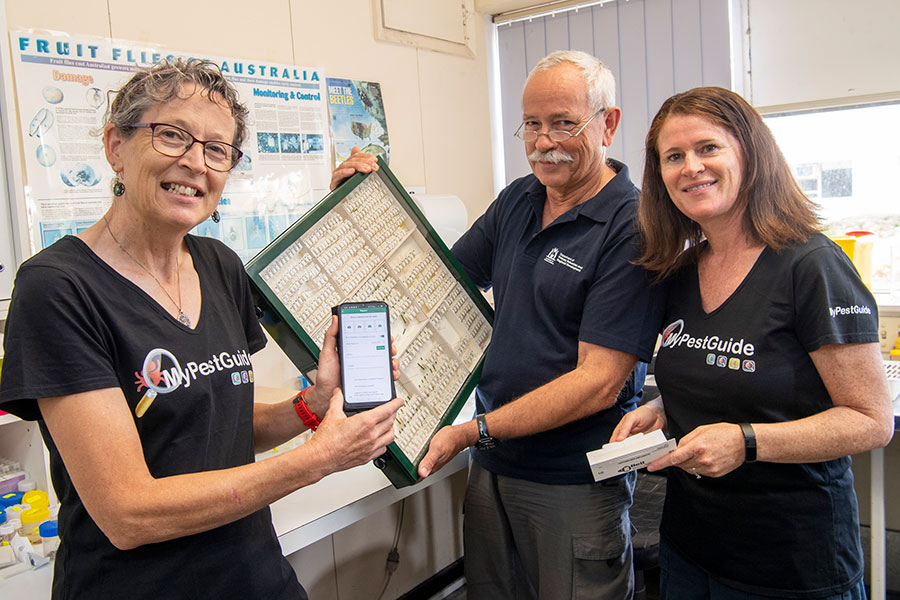The latest ‘Pantry Blitz’, an annual biosecurity surveillance project that focuses on various invasive stored product pests, has revealed no new exotic pests this year.
The Western Australian Department of Primary Industries and Regional Development’s (DPIRD) third ‘Pantry Blitz’ program supports the state’s biosecurity efforts and provides important data on the presence of pests across the state.
Demonstrating the absence of exotic pests is vital to continue growing the local grain industry and maintaining access to export markets.
Almost 1400 people participated in this year’s program – from Esperance to Kununurra – with the majority based in Perth.
Public participants were asked to check their pantries for insects by placing sticky insect traps in their pantries over a four-week period. During this time, they reported weekly by sending photographs of their traps, whether empty or with captures, via the MyPestGuide™ Reporter app for identification by DPIRD experts.
MyPestGuide™ applications were developed to encourage the public, industry and government to report observations of any common, interesting or possibly exotic pests, as well as the absence of pests across Australia.

Program manager Dr Rosalie McCauley (left), laboratory scientist Andras Szito and triage officer Elisha Cassidy discuss Pantry Blitz findings. Photo: PHA
DPIRD grains biosecurity officer Jeff Russell says not finding any new exotic pests is a great outcome for the WA grains industry. “This is good news, as ‘Pantry Blitz’ particularly targets a number of pests including those of stored grains,” he says.
Cigarette beetles (Lasioderma serricorne) were the most commonly found pests. A total of 4446 were found in 973 trap reports.
The second most commonly trapped insect was booklice (Psocoptera) with 1279 captures, and the third was the Indian meal moth (Plodia interpunctella), with 679 captures.
Indian meal moths are one of the most common pantry pests found around the world. They attack a wide variety of dry food and materials of vegetable origin including flours, pastry, herbs and spices.
These three pests, all of which are common to Australia and WA, can live and reproduce inside packaged products and eventually chew through thin plastic to escape and infest other products.
Various ants and spiders were reported in lower numbers.
Surveillance efforts
‘Pantry Blitz’ assists with DPIRD’s ongoing surveillance efforts for various exotic stored product pests and provides important data on the absence and presence of pests across WA.
‘Pantry Blitz’ program manager Dr Rosalie McCauley says 11 European carpet beetle larvae (Anthrenus verbasci) were found, which initially raised attention as they look similar to khapra beetle larvae. “All the carpet beetle larvae were brought into DPIRD for expert analysis,” Dr McCauley says.
Khapra beetle (Trogoderma granarium) is an exotic stored grain pest that could cause considerable damage to the Australian and WA grain industries. It is Australia’s number two national priority plant pest and the number one plant priority pest for grains.
‘Pantry Blitz’ also focuses on creating community awareness of plant pest reporting via the MyPestGuide™ app and assists in promoting the message that biosecurity is a shared responsibility.
“The public plays an important role in the first line of defence for WA’s biosecurity, all year round, by reporting observations of insect pests, weeds and diseases,” Dr McCauley says.
“Their participation is vital, since it provides verifiable evidence on the absence of insect pests that could threaten our agricultural and horticultural industries, and the environment. The program results can also help ensure an efficient and effective biosecurity response is rapidly initiated if and when required.”
The ‘Pantry Blitz’ data is used in a variety of ways, from supporting area freedom assessments to assisting with incident responses.
General insect pest reports can be made to DPIRD’s Pest and Disease Information Service at padis@dpird.wa.gov.au or 08 9368 3080.

























































